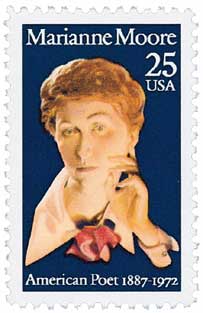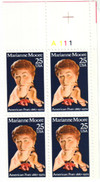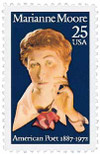
# 2449 - 1990 25c Literary Arts: Marianne Moore
US #2449
1990 Marianne Moore
- 8th stamp in Literary Arts series
- Honors the “first lady of poetry”
Stamp Category: Commemorative
Set: Literary Arts
Value: 25¢, First-Class mail rate
First Day of Issue: April 18,1990
First Day City: Brooklyn, New York
Quantity Issued: 150,000,000
Printed by: American Bank Note Company
Printing Method: Photogravure
Format: Panes of 50, from printing cylinders of 200
Perforations: 11
Why the stamp was issued: This stamp was issued to commemorate the life and poetry of Marianne Moore.
About the stamp design: M. Gregory Rudd was chosen to create the artwork for the Marianne Moore stamp. He was the artist behind the Ernest Hemingway stamp issued in 1989. Rudd was given a number of photos of the poet by Rosenbach Museum and Library, which holds her papers. He chose a photo taken of Moore when she was 47. The original was in black and white, so Rudd had to add color and lighten up the shadowed areas that were in the original photo.
Special design details: This was the first stamp in the Literary Arts series to include the identifying phrase “American Poet” and Moore’s birth and death dates.
First Day City: The First Day of Issue ceremony took place at The Brooklyn Museum, in Brooklyn, New York, where Moore was a longtime resident. The event included a reading of the poem “Moore of Brooklyn.”
About the Literary Arts Series: The Literary Arts Series began in 1979 with a John Steinbeck stamp. The objective of the Literary Arts Series is to honor America’s most renowned authors. As the USPS put it, “These skillful wordsmiths spun our favorite tales – and American history along with them.” The series honors both well-known and lesser-known authors, making it like an encapsulation of America’s rich and varied literary history.
The early stamps in the series listed only the subject’s name. Beginning with the 1990 Marianne Moore stamp, the description “American Poet” was added, along with her birth and death years.
History the stamp represents: During her lifetime, poetess Marianne Moore was the recipient of the most distinguished literary awards the U.S. had to offer. She has been called the "first lady of poetry.”
Moore’s ”Collected Poems” was published in 1951, and she received the Pulitzer Prize for Poetry in response to the work. She later translated 241 French fables and was awarded the Croix de Chevalier des Arts and Lettres from France.
Birth of Marianne Moore

Marianne Craig Moore was born on November 15, 1887, in Kirkwood, Missouri. Considered one of the greatest American female poets, Moore received several distinguished literary awards during her lifetime.
Moore grew up around St. Louis until she was 16, after which her family moved to Pennsylvania. Moore attended Bryn Mawr College, where she majored in history, economics, and political science. During her time there, Moore wrote short stories and poems for the school’s literary magazine. It was also during her time at Bryn Mawr that Moore became involved in the women’s suffrage movement. She attended parades and later wrote prose and poetry on the subject. After graduating, Moore worked at the Lake Placid Club and taught business at the Carlisle Indian Industrial School.
US #2449
1990 Marianne Moore
- 8th stamp in Literary Arts series
- Honors the “first lady of poetry”
Stamp Category: Commemorative
Set: Literary Arts
Value: 25¢, First-Class mail rate
First Day of Issue: April 18,1990
First Day City: Brooklyn, New York
Quantity Issued: 150,000,000
Printed by: American Bank Note Company
Printing Method: Photogravure
Format: Panes of 50, from printing cylinders of 200
Perforations: 11
Why the stamp was issued: This stamp was issued to commemorate the life and poetry of Marianne Moore.
About the stamp design: M. Gregory Rudd was chosen to create the artwork for the Marianne Moore stamp. He was the artist behind the Ernest Hemingway stamp issued in 1989. Rudd was given a number of photos of the poet by Rosenbach Museum and Library, which holds her papers. He chose a photo taken of Moore when she was 47. The original was in black and white, so Rudd had to add color and lighten up the shadowed areas that were in the original photo.
Special design details: This was the first stamp in the Literary Arts series to include the identifying phrase “American Poet” and Moore’s birth and death dates.
First Day City: The First Day of Issue ceremony took place at The Brooklyn Museum, in Brooklyn, New York, where Moore was a longtime resident. The event included a reading of the poem “Moore of Brooklyn.”
About the Literary Arts Series: The Literary Arts Series began in 1979 with a John Steinbeck stamp. The objective of the Literary Arts Series is to honor America’s most renowned authors. As the USPS put it, “These skillful wordsmiths spun our favorite tales – and American history along with them.” The series honors both well-known and lesser-known authors, making it like an encapsulation of America’s rich and varied literary history.
The early stamps in the series listed only the subject’s name. Beginning with the 1990 Marianne Moore stamp, the description “American Poet” was added, along with her birth and death years.
History the stamp represents: During her lifetime, poetess Marianne Moore was the recipient of the most distinguished literary awards the U.S. had to offer. She has been called the "first lady of poetry.”
Moore’s ”Collected Poems” was published in 1951, and she received the Pulitzer Prize for Poetry in response to the work. She later translated 241 French fables and was awarded the Croix de Chevalier des Arts and Lettres from France.
Birth of Marianne Moore

Marianne Craig Moore was born on November 15, 1887, in Kirkwood, Missouri. Considered one of the greatest American female poets, Moore received several distinguished literary awards during her lifetime.
Moore grew up around St. Louis until she was 16, after which her family moved to Pennsylvania. Moore attended Bryn Mawr College, where she majored in history, economics, and political science. During her time there, Moore wrote short stories and poems for the school’s literary magazine. It was also during her time at Bryn Mawr that Moore became involved in the women’s suffrage movement. She attended parades and later wrote prose and poetry on the subject. After graduating, Moore worked at the Lake Placid Club and taught business at the Carlisle Indian Industrial School.











